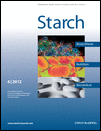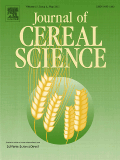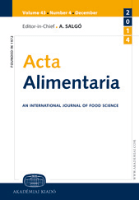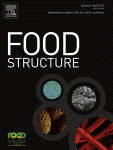
STARCH-STARKE
Scope & Guideline
Advancing Knowledge in Food Science and Organic Chemistry
Introduction
Aims and Scopes
- Starch Characterization and Properties:
Research on the physicochemical, thermal, and rheological properties of starch from various sources, including native and modified starches, to understand their behavior in different applications. - Starch Modification Techniques:
Studies focused on various physical and chemical modification methods to enhance the functional properties of starch, such as gelatinization, retrogradation, and digestibility. - Applications of Starch in Food Science:
Investigations into the use of starch in food formulations, including its role in texture, stability, and nutritional aspects, particularly in relation to resistant starch and dietary fibers. - Biodegradable and Sustainable Materials:
Research on developing starch-based biopolymers and composites for sustainable applications, including biodegradable films and packaging materials. - Nanotechnology in Starch Research:
Exploration of starch nanostructures and their applications in drug delivery systems, food preservation, and as functional additives. - Health Implications of Starch Consumption:
Studies examining the impact of different types of starch on health, including their effects on glycemic indices, digestive health, and potential as functional foods.
Trending and Emerging
- Sustainable and Biodegradable Starch Applications:
A growing emphasis on developing starch-based materials that are environmentally friendly and biodegradable, especially in packaging and film applications. - Health Benefits and Functional Foods:
Increasing research on the health implications of resistant starch and its role as a functional food ingredient, particularly in managing diabetes and promoting gut health. - Advanced Modification Techniques:
Emerging interest in novel modification techniques, including enzymatic, ultrasonic, and microwave-assisted methods, to enhance the properties and functionalities of starch. - Starch Nanotechnology:
A noticeable trend towards investigating starch nanoparticles and their applications in drug delivery, food preservation, and as smart materials. - Cross-Disciplinary Applications of Starch:
Research is expanding into interdisciplinary applications of starch, including in biomedical fields, such as drug delivery systems and wound dressings, reflecting its versatility beyond traditional uses.
Declining or Waning
- Traditional Starch Sources:
Research on conventional starch sources, such as potato and corn, appears to be waning as interest shifts toward underutilized and novel starch sources that offer unique properties and functionalities. - Basic Starch Chemistry:
Studies that focus solely on the fundamental chemistry of starch without application contexts are becoming less frequent, as the journal emphasizes more applied research. - Starch in Non-Food Applications:
The exploration of starch applications outside the food industry, such as in industrial processes or non-biodegradable materials, has seen a decrease, with a stronger focus on sustainable and biodegradable alternatives.
Similar Journals

Journal of Cereal Science
Innovating food science with every publication.The Journal of Cereal Science, published by ACADEMIC PRESS LTD- ELSEVIER SCIENCE LTD, stands as a pivotal platform for the dissemination of high-quality research in the fields of biochemistry and food science, maintaining an impressive impact factor that reflects its influential position in academia. With a Q1 ranking in Food Science and a Q2 in Biochemistry as of 2023, the journal is recognized for its rigorous peer-review process and its commitment to advancing the understanding of cereal grains and their applications. Since its inception in 1983, the journal has provided comprehensive insights into areas such as grain genetics, processing technology, and nutritional aspects of cereals, catering to an audience of researchers, professionals, and students alike. The scope encompasses a diverse range of topics, ensuring a broad interdisciplinary appeal. Published through the prestigious Elsevier platform, it fosters global collaboration and knowledge sharing, thereby playing a crucial role in shaping the future of cereal science.

Food Biophysics
Bridging Disciplines to Transform Food ScienceWelcome to Food Biophysics, an esteemed journal published by SPRINGER, dedicated to advancing the field of food science through the lens of biophysics. With an ISSN of 1557-1858 and an E-ISSN of 1557-1866, this journal provides a platform for the dissemination of innovative research from 2006 to 2024. Food Biophysics holds a distinguished position in the academic community, boasting a Q1 ranking in Food Science and Q2 rankings in Analytical Chemistry, Applied Microbiology and Biotechnology, Bioengineering, and Biophysics. This positions the journal in the 73rd percentile for Food Science, signifying its relevance and influence in the field. Although not Open Access, it remains an invaluable resource for researchers, professionals, and students interested in the intricate biophysical properties of food materials and processes. Explore cutting-edge findings that bridge disciplines and advance our understanding of how biophysics can innovate food preservation, safety, and quality.

Carbohydrate Polymer Technologies and Applications
Exploring the Future of Carbohydrate Polymers and Their ApplicationsCarbohydrate Polymer Technologies and Applications, published by ELSEVIER, is an esteemed open access journal that has been fostering innovation in the field of carbohydrate polymer research since its inception in 2020. With its ISSN 2666-8939, this journal is dedicated to exploring the intersections of analytical chemistry, biochemistry, biotechnology, and materials science, making significant contributions to our understanding of carbohydrate polymers and their diverse applications across various industries. Notably, it has attained a prominent position in various categories, reflecting its quality and impact: ranked Q1 in Analytical Chemistry, Biotechnology, and several Materials Science disciplines, while maintaining strong positions in the Q2 and other quartiles. Additionally, with impressive Scopus rankings—14th in Chemistry (miscellaneous) and 23rd in Analytical Chemistry—it stands at the forefront of scholarly dialogue in these areas, appealing to researchers, professionals, and students alike. The journal's commitment to open access facilitates wider dissemination of knowledge and enhances collaborative research, solidifying its role as a pivotal resource for advancing carbohydrate polymer technologies.

ACTA ALIMENTARIA
Championing research excellence in the food industry.ACTA ALIMENTARIA is a renowned journal in the field of food science, published by AKADEMIAI KIADO ZRT, based in Hungary. Since its inception in 1973, it has served as a vital platform for disseminating high-quality research on food chemistry, microbiology, nutrition, and technology, contributing significantly to the advancement of knowledge in the agricultural and biological sciences. Currently classified in the Q3 quartile of the 2023 Food Science category, the journal is positioned to address pressing issues pertaining to food safety, quality, and sustainability, making it an invaluable resource for researchers, professionals, and students alike. Although it does not currently offer open access, the journal maintains a strong reputation with a readership keenly interested in the latest developments in food science. With a Scopus rank placing it in the 38th percentile of its category, ACTA ALIMENTARIA continues to be a pivotal reference for those engaged in food research and innovation.

ITALIAN JOURNAL OF FOOD SCIENCE
Cultivating a Global Dialogue on Food ScienceITALIAN JOURNAL OF FOOD SCIENCE is a distinguished open-access publication dedicated to advancing knowledge in the field of food science, catering to a global audience of researchers, professionals, and students. Published by Codon Publications in Singapore, this journal, operating under the ISSN 1120-1770 and E-ISSN 2239-5687, has been a vital platform for scholarly discourse since its inception in 1996, converging towards a comprehensive view of food science trends through 2024. With an impressive ranking in the third quartile (Q3) of the Food Science category and a Scopus rank of #151 out of 389, the journal plays a significant role in disseminating high-quality research, contributing to a richer understanding of food science within the agricultural and biological sciences. Since transitioning to open access in 2008, it has further expanded its reach, ensuring that innovative research is accessible to all, thereby fostering collaboration and knowledge exchange in this vital industry.

JOURNAL OF FOOD SCIENCE AND TECHNOLOGY-MYSORE
Exploring Innovations in Food Science Since 1974JOURNAL OF FOOD SCIENCE AND TECHNOLOGY-MYSORE, published by SPRINGER INDIA, is a distinguished peer-reviewed journal that has been contributing to the ever-evolving field of food science since its inception in 1974. With an ISSN of 0022-1155 and E-ISSN 0975-8402, this journal holds a commendable position in the Q2 category for Food Science, as per the 2023 metrics, and ranks #58 out of 389 in Scopus's Agricultural and Biological Sciences sector, achieving an impressive 85th percentile. The journal publishes high-quality research articles, reviews, and case studies that cover a wide array of topics, from food preservation to innovative technologies in food processing. Although it is not an open-access journal, it endeavors to disseminate essential knowledge and research strategies that advance food science and benefit both industry professionals and academia. The geographical reach of the journal, alongside its rigorous editorial standards, solidifies its stature as a pivotal resource for researchers, professionals, and students dedicated to the enhancement of food science practices and technologies.

Food Packaging and Shelf Life
Integrating disciplines to tackle food preservation challenges.Food Packaging and Shelf Life is an esteemed peer-reviewed journal published by Elsevier, dedicated to advancing the field of food science through innovative research on packaging materials and their impact on food preservation. With an impressive impact factor and ranking within the Q1 quartile across several categories—including Biomaterials, Food Science, and Microbiology (medical) provided in Scopus raking—this journal serves as a vital resource for researchers, academics, and industry professionals aiming to enhance food safety and quality. Established in 2014, it encompasses a multidisciplinary approach that integrates engineering, microbiology, and materials science perspectives to address current challenges in food packaging. Although currently not an open-access journal, it offers various subscription options, ensuring accessibility to cutting-edge research. As the sector rapidly evolves, Food Packaging and Shelf Life remains a critical platform for disseminating knowledge and fostering collaboration in the pursuit of sustainable food systems.

Food Structure-Netherlands
Unveiling the Future of Food Structure ResearchFood Structure-Netherlands, published by Elsevier, stands at the forefront of research in the fields of Applied Microbiology and Biotechnology, Bioengineering, and Food Science. With its ISSN 2213-3291 and a commendable position in the 2023 Q1 category rankings, this journal serves as a vital platform for scholars and professionals seeking to explore the innovative intersections of food structure and its multifaceted applications. The journal has garnered significant recognition, ranking 67th in Food Science and 36th in Applied Microbiology and Biotechnology, placing it in the top echelons of its field with 82nd and 72nd percentiles, respectively. Spanning years from 2014 to 2024, Food Structure-Netherlands aims to disseminate high-quality research that fosters the advancement of knowledge, promoting sustainable practices and technological innovations in the food industry. Researchers, professionals, and students will find this journal to be an invaluable resource for cutting-edge studies and emerging trends in food structure and functionality.

Polysaccharides
Fostering Open Access to Groundbreaking Polysaccharide ResearchPolysaccharides is a leading academic journal published by MDPI, specializing in the interdisciplinary field of polysaccharide research. Since its inception in 2020, this Open Access journal aims to facilitate the dissemination of groundbreaking research in materials science, chemistry, and engineering. With an impressive ranking among the top-tier journals—holding the 29th position in Engineering, the 20th in Chemistry, and the 42nd in Materials Science according to Scopus—it offers a significant platform for researchers and professionals seeking to enrich their understanding of polysaccharides' properties, applications, and innovations. The journal welcomes contributions that advance knowledge in polysaccharide chemistry, structural analysis, and various applications in pharmaceuticals, food sciences, and biomaterials. Located in the heart of Basel, Switzerland, Polysaccharides is poised to be a critical resource for anyone looking to stay at the forefront of polysaccharide research and applications, with publications openly accessible to a global audience.

BIOPOLYMERS
Unraveling Nature's Complex PolymersBIOPOLYMERS, a distinguished journal founded in 1963 and published by WILEY, serves as an essential platform for the dissemination of research in the fields of biochemistry, biomaterials, biophysics, and organic chemistry. With an ISSN of 0006-3525 and E-ISSN 1097-0282, this journal has been pivotal in advancing our understanding of the intricate roles that biopolymers play in various biological systems and their applications in medicine and technology. The journal is recognized for its rigorous peer-review process and has established itself within the academic community, boasting impressive Scopus rankings across multiple disciplines, including a Q2 ranking in both Biophysics and Medicine for 2023. Although it does not offer Open Access options, BIOPOLYMERS provides invaluable access to critical insights and developments in the study of biopolymers, appealing to researchers, professionals, and students dedicated to innovating in this dynamic field.